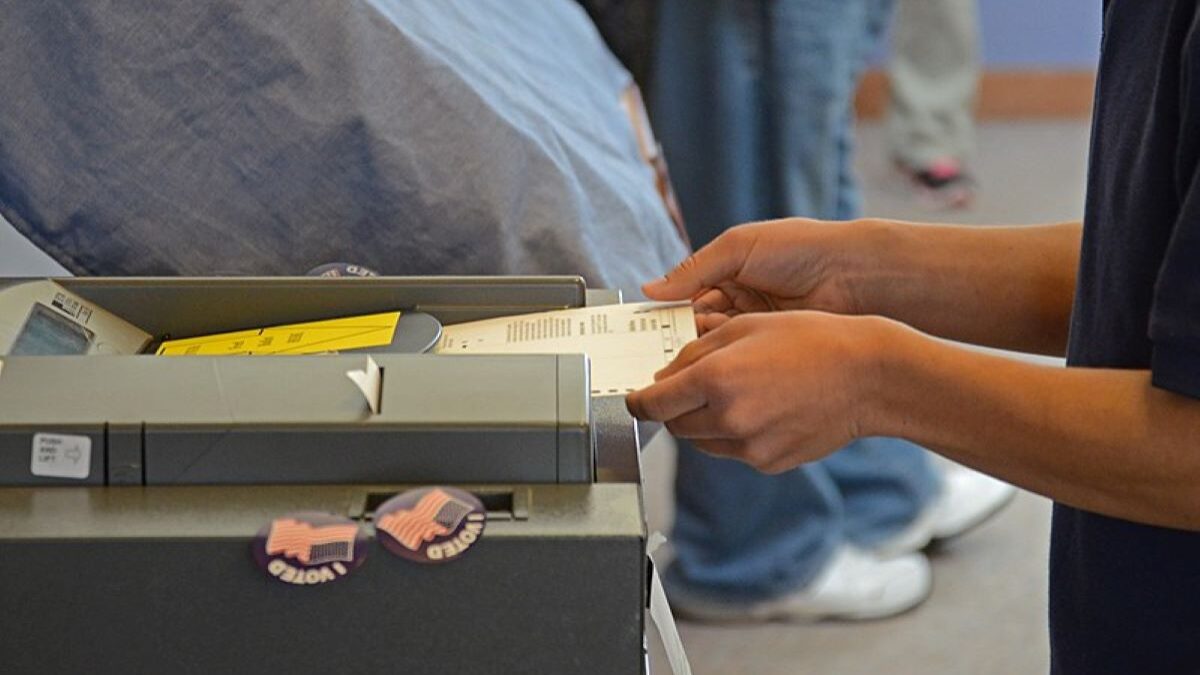States and localities are finding out in real-time how terrible ranked-choice voting (RCV) is for their respective elections. From Alaska to Virginia, the leftist-backed election system gaining traction throughout the country is leading to undesirable election outcomes and confusion among voters.
Under RCV, often dubbed “rigged-choice voting” by its critics, voters rank candidates in order of preference. If no candidate receives more than 50 percent of first-choice votes in the first round of voting, the last-place finisher is eliminated, and his votes are reallocated to the voter’s second-choice candidate.
Despite the many failures associated with its use, RCV proponents are searching for ways to deceive voters into adopting the system for their local and state elections across the nation. A polling memo obtained by The Federalist shows exactly how they intend to do it.
Produced by HighGround Inc., a public affairs consulting group, the document analyzes what pro-RCV talking points work best in convincing voters to get on board with the controversial system. Conducted among 500 likely 2024 Arizona voters, the survey found that misleading arguments centered around “the idea of fairness” appear to resonate with the electorate. Among these are claims that RCV shifts power to voters, ensures “all candidates and voters [are] equal,” and empowers independents (the largest voting bloc in Arizona).
In its memo, HighGround noted how emphasizing “fairness” when pitching RCV to voters is effective because it’s a “universal virtue and value which no one can successfully argue with.” It’s these types of arguments, the group claimed, that can be effective in convincing Arizonans to vote down a 2024 constitutional amendment proposal that would reportedly bar the use of RCV in the Grand Canyon State.
In addition to analyzing talking points hyping RCV, HighGround also surveyed arguments opposing the system to help ranked-choice proponents outmaneuver election integrity activists’ warning of RCV’s failures. While the poll’s findings indicate claims that RCV is “absolute chaos” and a “dangerous idea” don’t resonate with likely Arizona voters, arguments that the system would bring California-style primaries to the state appear to work best in generating opposition to RCV.
While speaking with The Federalist, an election integrity expert highlighted how the memo confirms what RCV critics have accurately assessed: The system’s proponents have to “dance around” what it actually does to the elections process and obfuscate the reality that RCV implements a jungle primary-like model in order to get voters’ support.
Another elections specialist separately told The Federalist that the memo shows how RCV proponents have an “uphill battle” ahead of them, and to sell the system to voters they must “mislead” the electorate about its true nature.
Internal RCV Polling by The Federalist
RCV’s Dark History
Contrary to proponents’ grossly misleading talking points, governments using RCV for their respective elections have produced anything but “fair” outcomes for voters. During Maine’s 2018 elections, for example, then-incumbent GOP Rep. Bruce Poliquin lost to Democrat Jared Golden despite Poliquin winning the most votes in the first round of voting. That outcome was due to the state’s ranked-choice voting system.
Meanwhile, Alaska has also had its fair share of undesirable election outcomes since adopting the practice in 2020. During the state’s 2022 special election for its at-large congressional district, ranked-choice voting propelled Democrat Mary Peltola to victory even though “nearly 60 percent of voters [cast] their ballots for a Republican.” RCV also played a major role in helping Alaska GOP Sen. Lisa Murkowski fend off a challenge from conservative challenger Kelly Tshibaka during the November 2022 midterms.
[RELATED: Ranked-Choice Voting Is The Monster Under The Bed Of American Elections]
Various U.S. municipalities that have adopted RCV have also experienced confusing and even inaccurate election outcomes. In an Oakland school board race, for instance, “election officials announced — two months after the fact — that they got the count wrong,” resulting in the “rightful winner … suing for his seat.” Meanwhile, a Utah town that used an RCV pilot program for its 2021 municipal elections experienced high rates of ballots being discarded or spoiled.
After using the system for a June 20 primary election, officials in Arlington, Virginia, opted not to use the practice for its Nov. 7 elections, “pointing to confusion about the process” among voters and “concerns about whether outreach efforts were translating to diverse support for the new system.”
But these examples highlighting the chaos associated with ranked-choice voting haven’t stopped its advocates from deceptively pushing voters throughout the country from adopting the system for their respective local elections. During this month’s off-year elections, residents in three Michigan cities voted to adopt RCV for their local elections should state lawmakers pass legislation allowing for the system’s use. Minnetonka, Minnesota, voters similarly voted to keep RCV for its municipal contests after first adopting the practice in 2020.
It’s worth mentioning that both Michigan and Minnesota Democrats have introduced bills in recent state legislative sessions that sought to authorize RCV’s use for various elections.
Coming off their 2023 successes, RCV advocates are seeking to further expand the system’s use in other states and localities. In Nevada, RCV proponents successfully got a pro-RCV constitutional amendment placed on the state’s 2022 ballot and managed to convince enough voters to pass it. If approved by a majority of voters again during the 2024 elections, Nevada will adopt a top-five RCV system, in which voters rank their top five preferred candidates in federal and state primary and general elections.
The amendment would not allow RCV’s use for presidential elections, however.
While RCV supporters didn’t collect enough signatures to get a similar initiative on Missouri’s 2022 ballot, they’re actively seeking to do so for the state’s 2024 elections. Other states being targeted by RCV advocates include Arizona, Wisconsin, Idaho, and Oregon.








